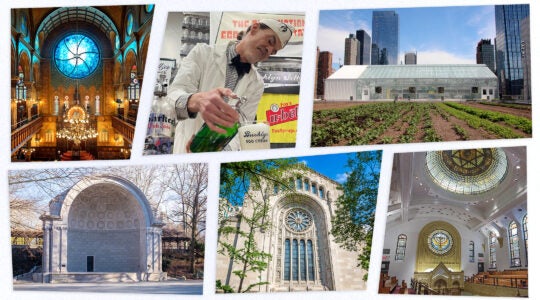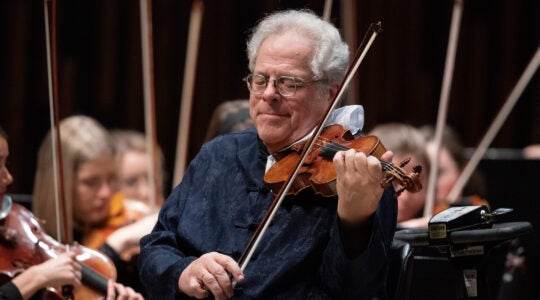With empty seats and shrinking budgets, and virtual boycotts from some venues abroad, Israel’s performing arts scene has had it rough the last two years. But not Vertigo Dance Company.
According to general manager Adi Sha’al, the 10-year-old contemporary dance troupe is packing houses, even if they’re not exactly selling out. "In these times when theaters are quite empty and people are more into TV, and elections are coming and everything, our houses are full – and not always because we’re so good," Sha’al said, jokingly, of the company known for its hard-hitting choreography in an interview from his home in Jerusalem.
The reason? Sometimes they give it away.
At the end of regular free performances, dancers move through the aisles with upturned hats. "And people fight for the privilege to put some money in," Sha’al said. "Somehow the box office [earnings] is not less than other performances. It’s amazing."
Vertigo is taking a short break from its performance schedule in Israel to appear Feb. 2 at the second annual Israel Non-Stop Festival organized by the JCC in Manhattan. The daylong event features ongoing dance, theater and music performances, including numerous collaborations that create original artistic languages based on familiar vocabularies.
"It’s not your grandmother’s Israel," said the festival’s organizer, Karen Sander. "It’s not Jerusalem of Gold. There’s fresh culture out there." Through intense networking both here and in Israel, Sander, who is the JCC’s senior director of arts and culture, sought out emerging Israeli artists whom she rarely sees in New York.
Vertigo performs one of its earliest works, a duet called "Vertigo," and a new piece "The Power of Balance," which was the subject of a prize-winning documentary by the same name. In the new work, dancers with and without disabilities move together on crutches, in wheelchairs and on foot in flawlessly synchronized motions.
Other performers include the Yemenite singer Lea Avraham, who teams up with composer Ori Leshman to give a fresh perspective on the biblical story of Leah. The multicultural Acco Theater Center plumbs the essence of human spirituality by merging Muslim, Christian ritual music and dance in "Prayer." The East-West Ensemble melds Jewish global musical traditions, jazz and classical, into contemporary compositions for what the composer Yisrael Borochov calls "imaginary rituals." Choreographer Yossi Yungman and film star Esty Zakheim blend movement and spoken word in a piece about the search for hope.
Sander said that in speaking to the artists, she picked up on a common theme: In recent years, many had made conscious decisions to persevere in the face of what seem like overwhelming political circumstances and underwhelming public interest.
One of them was Yungman. Last April, the Argentine native and former lead dancer with the Batsheva Dance Company was in the first stages of planning a collaboration with Zakheim, who starred in the Israeli award-winning film "Afula Express."
"It was a bad time in Israel, " he told The Jewish Week. "Every day there was a bomb, a suicide or something like that. I think people were paralyzed. I felt this way as well."
When Yungman met with Zakheim, a plus-size actress he admired and wanted to have dancing on stage, the two decided that "the best we can do is keep doing as artists." The title of their piece, "Aifo Tiki?" which combines expressive movement and excerpts from Chekhov, means "Where is Little Hope?" in English.
Members of the 17-year-old Acco Theater Center, located in the former Crusader stronghold on Israel’s northern coast, had to stop working temporarily because audiences, fearing unrest in the Arab-Jewish city, stayed home. Eventually, "people got used to the situation and wanted to get back to life," said Ibrahim Miari, a dancer and regular member of the theater’s multiethnic company.
Company founder Smadar Yaaron said she decided to produce "Prayer" in response to "the disturbing reality in which we are living." But her work has been a hard sell. Worn down by the stress of the past years, more and more people prefer the easy escapism of commercial entertainment. And at the same time, she sees less tolerance and cultural openness. At a recent performance of "Prayer," one audience member complained about a muezzin’s call at the start of the soundtrack.
Yaaron and other Israeli performers still see their work answering an urgent need for alternative possibilities and unexplored points of view.
Sha’al said he and his partner, Vertigo’s artistic director Noa Wertheim, got the idea of free performances two years ago in New York while participating in a post-9-11 panel on "the role of the artist in times of crisis."
"Unfortunately we had a lot to say over there," Sha’al said. "We’re experienced in canceling shows and not knowing if there will be a show or not." When the Americans on the panel questioned whether or not artistic endeavors were necessary, Sha’al and Wertheim were quick to answer: "What we’re doing is a [basic] need for society."
The company decided to keep its home base and dance school in Jerusalem, despite attractive offers from other cities in Israel. "We feel our role here is very important," Sha’al said. "Every week, [students] come and say, ‘This gives me the power for all the week. I hear it more and more.’ "
Israel Non-Stop takes place at John Jay College Theater, 899 10th Ave., Manhattan, (646) 505-5708. Sun., February 2, 12-6 p.m. (Come and go or stay all day.) $25, $20. Meet the Artists in a discussion about the current artistic climate in Israel on Thurs., Jan. 30, 8 p.m.
The New York Jewish Week brings you the stories behind the headlines, keeping you connected to Jewish life in New York. Help sustain the reporting you trust by donating today.




